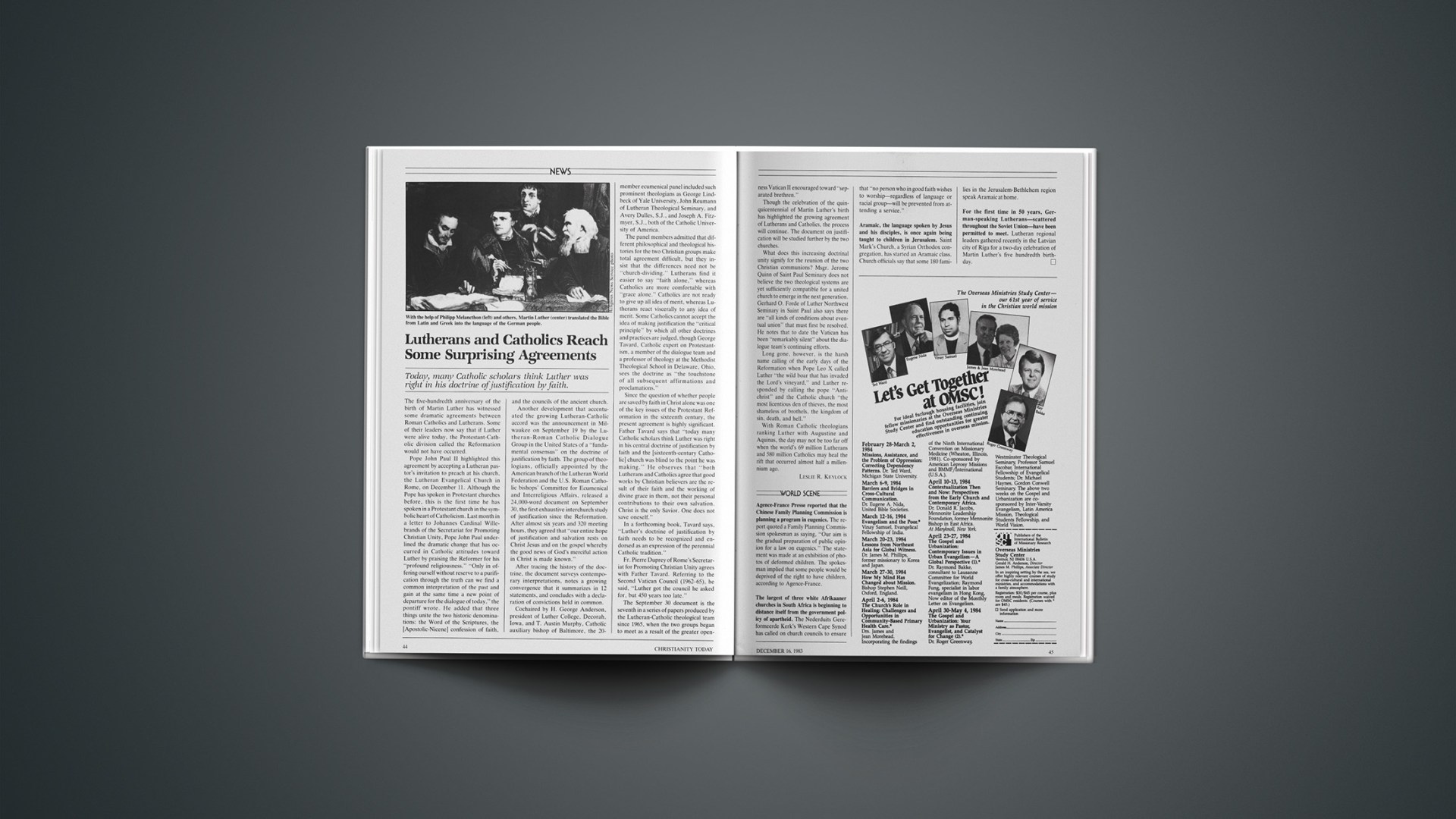Today, many Catholic scholars think Luther was right in his doctrine of justification by faith.
The five-hundredth anniversary of the birth of Martin Luther has witnessed some dramatic agreements between Roman Catholics and Lutherans. Some of their leaders now say that if Luther were alive today, the Protestant-Catholic division called the Reformation would not have occurred.
Pope John Paul II highlighted this agreement by accepting a Lutheran pastor’s invitation to preach at his church, the Lutheran Evangelical Church in Rome, on December 11. Although the Pope has spoken in Protestant churches before, this is the first time he has spoken in a Protestant church in the symbolic heart of Catholicism. Last month in a letter to Johannes Cardinal Wille-brands of the Secretariat for Promoting Christian Unity, Pope John Paul underlined the dramatic change that has occurred in Catholic attitudes toward Luther by praising the Reformer for his “profound religiousness.” “Only in offering ourself without reserve to a purification through the truth can we find a common interpretation of the past and gain at the same time a new point of departure for the dialogue of today,” the pontiff wrote. He added that three things unite the two historic denominations: the Word of the Scriptures, the [Apostolic-Nicene] confession of faith, and the councils of the ancient church.
Another development that accentuated the growing Lutheran-Catholic accord was the announcement in Milwaukee on September 19 by the Lutheran-Roman Catholic Dialogue Group in the United States of a “fundamental consensus” on the doctrine of justification by faith. The group of theologians, officially appointed by the American branch of the Lutheran World Federation and the U.S. Roman Catholic bishops’ Committee for Ecumenical and Interreligious Affairs, released a 24,000-word document on September 30, the first exhaustive interchurch study of justification since the Reformation. After almost six years and 320 meeting hours, they agreed that “our entire hope of justification and salvation rests on Christ Jesus and on the gospel whereby the good news of God’s merciful action in Christ is made known.”
After tracing the history of the doctrine, the document surveys contemporary interpretations, notes a growing convergence that it summarizes in 12 statements, and concludes with a declaration of convictions held in common.
Cochaired by H. George Anderson, president of Luther College, Decorah, Iowa, and T. Austin Murphy, Catholic auxiliary bishop of Baltimore, the 20-member ecumenical panel included such prominent theologians as George Lindbeck of Yale University, John Reumann of Lutheran Theological Seminary, and Avery Dulles, S.J., and Joseph A. Fitzmyer, S.J., both of the Catholic University of America.
The panel members admitted that different philosophical and theological histories for the two Christian groups make total agreement difficult, but they insist that the differences need not be “church-dividing.” Lutherans find it easier to say “faith alone,” whereas Catholics are more comfortable with “grace alone.” Catholics are not ready to give up all idea of merit, whereas Lutherans react viscerally to any idea of merit. Some Catholics cannot accept the idea of making justification the “critical principle” by which all other doctrines and practices are judged, though George Tavard, Catholic expert on Protestantism, a member of the dialogue team and a professor of theology at the Methodist Theological School in Delaware, Ohio, sees the doctrine as “the touchstone of all subsequent affirmations and proclamations.”
Since the question of whether people are saved by faith in Christ alone was one of the key issues of the Protestant Reformation in the sixteenth century, the present agreement is highly significant. Father Tavard says that “today many Catholic scholars think Luther was right in his central doctrine of justification by faith and the [sixteenth-century Catholic] church was blind to the point he was making.” He observes that “both Lutherans and Catholics agree that good works by Christian believers are the result of their faith and the working of divine grace in them, not their personal contributions to their own salvation. Christ is the only Savior. One does not save oneself.”
In a forthcoming book, Tavard says, “Luther’s doctrine of justification by faith needs to be recognized and endorsed as an expression of the perennial Catholic tradition.”
Fr. Pierre Duprey of Rome’s Secretariat for Promoting Christian Unity agrees with Father Tavard. Referring to the Second Vatican Council (1962–65), he said, “Luther got the council he asked for, but 450 years too late.”
The September 30 document is the seventh in a series of papers produced by the Lutheran-Catholic theological team since 1965, when the two groups began to meet as a result of the greater openness Vatican II encouraged toward “separated brethren.”
Though the celebration of the quin-quicentennial of Martin Luther’s birth has highlighted the growing agreement of Lutherans and Catholics, the process will continue. The document on justification will be studied further by the two churches.
What does this increasing doctrinal unity signify for the reunion of the two Christian communions? Msgr. Jerome Quinn of Saint Paul Seminary does not believe the two theological systems are yet sufficiently compatible for a united church to emerge in the next generation. Gerhard O. Forde of Luther Northwest Seminary in Saint Paul also says there are “all kinds of conditions about eventual union” that must first be resolved. He notes that to date the Vatican has been “remarkably silent” about the dialogue team’s continuing efforts.
Long gone, however, is the harsh name calling of the early days of the Reformation when Pope Leo X called Luther “the wild boar that has invaded the Lord’s vineyard,” and Luther responded by calling the pope “Antichrist” and the Catholic church “the most licentious den of thieves, the most shameless of brothels, the kingdom of sin, death, and hell.”
With Roman Catholic theologians ranking Luther with Augustine and Aquinas, the day may not be too far off when the world’s 69 million Lutherans and 580 million Catholics may heal the rift that occurred almost half a millennium ago.
World Scene
Agence-France Presse reported that the Chinese Family Planning Commission is planning a program in eugenics. The report quoted a Family Planning Commission spokesman as saying, “Our aim is the gradual preparation of public opinion for a law on eugenics.” The statement was made at an exhibition of photos of deformed children. The spokesman implied that some people would be deprived of the right to have children, according to Agence-France.
The largest of three white Afrikaaner churches in South Africa is beginning to distance itself from the government policy of apartheid. The Nederduits Gereformeerde Kerk’s Western Cape Synod has called on church councils to ensure that “no person who in good faith wishes to worship—regardless of language or racial group—will be prevented from attending a service.”
Aramaic, the language spoken by Jesus and his disciples, is once again being taught to children in Jerusalem. Saint Mark’s Church, a Syrian Orthodox congregation, has started an Aramaic class. Church officials say that some 180 families in the Jerusalem-Bethlehem region speak Aramaic at home.
For the first time in 50 years, German-speaking Lutherans—scattered throughout the Soviet Union—have been permitted to meet. Lutheran regional leaders gathered recently in the Latvian city of Riga for a two-day celebration of Martin Luther’s five hundredth birthday.
‘Physically And Emotionally Defeated,’ Head Of Ncc Resigns
Citing “an exhausting and inhuman work schedule” that has left him “physically and emotionally defeated,” James Armstrong last month resigned as president of the National Council of the Churches of Christ in the U.S.A. (NCC). He also left his post as United Methodist bishop of Indiana.
In a written resignation, Armstrong said he had “failed many persons as well as the gospel. I deeply regret what I have done to my loved ones, to dear and trusting friends, and to those unknown persons who look to me for exemplary leadership.…
“I have advocated unpopular causes and identified with controversial issues, believing I was being faithful to my conscience and to the Word of God. I am not here renouncing the message I have preached.
“I would have friends and critics alike draw hard lessons from my example, that their responses might strengthen the witness and lend credibility to the ministry of the Church of Jesus.”
A council spokeswoman said Armstrong resigned for “personal reasons” and not because of the ongoing controversy that has plagued the NCC.
Last month, less than a week before he resigned, Armstrong presided over a stormy governing board meeting (see accompanying article). Armstrong told the 263 governing board members that it was the most difficult one over which he had presided. At the end of the meeting a delegate commended him for his skill in chairing the floor debate, and delegates gave him a standing ovation.
Before he was elected president of the NCC, Armstrong had not served on the governing board. But by the end of the last month’s meeting, he jokingly said, “I’m not a new kid on the block now. I’m sweating and beaten right now. I’ve been on the block a long time.”
NCC First Vice President Philip R. Cousin, a bishop of the African Methodist Episcopal Church, will complete the remaining year of Armstrong’s term.










